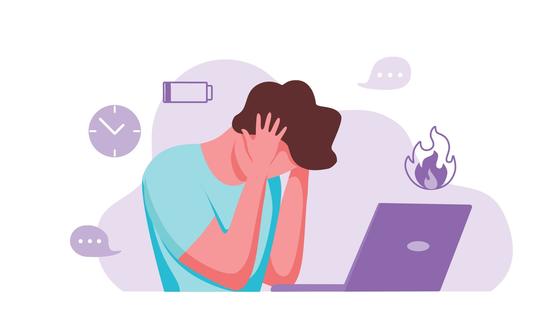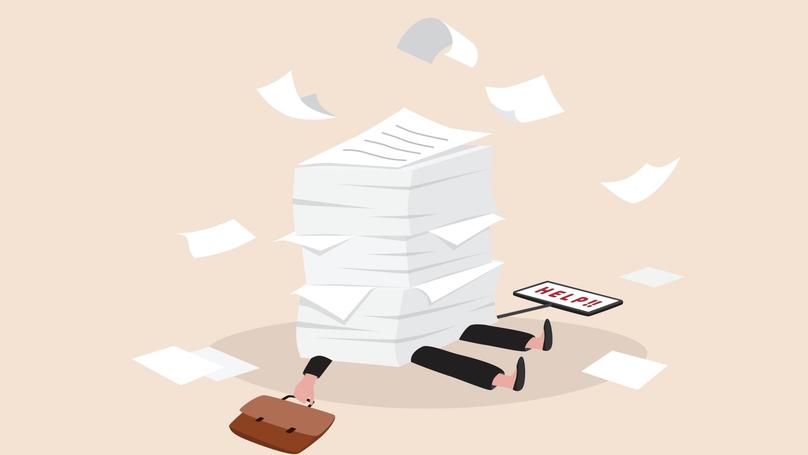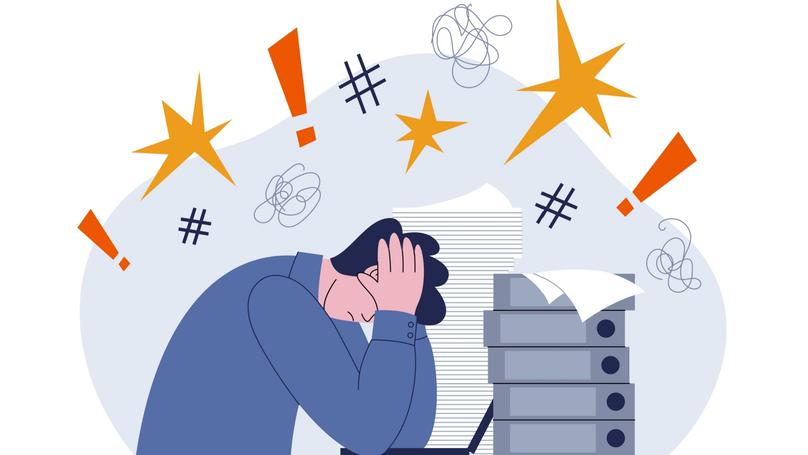What is professional burnout, and what do you do if you are "burnt out?"
You've likely experienced a reluctance to go to work, persistent fatigue, apathy, and an overwhelming sense of hopelessness at some point in your career.

At first, these symptoms may not appear particularly alarming or frightening. Some might dismiss them as simply having a bad day at work. Nevertheless, if you find yourself in this state more and more frequently, you cease to derive pleasure from the efforts of your work; every morning, you come up with excuses for skipping upcoming work - you have been overtaken by professional burnout. What can be done in this situation, and can it be managed? Let's take a closer look.
Burnout: everything you need to know

Burnout is characterised by persistent emotional exhaustion, increasing feelings of tension, and physical fatigue. This condition frequently arises due to persistent, unprocessed stress, excessive physical strain, overwhelming responsibilities, constant deadlines, and lack of support from colleagues and loved ones. Furthermore, burnout can be caused by a person's personal characteristics and character traits. For instance, traits such as perfectionism, hyper-responsibility, difficulty delegating responsibilities, an intense need for control, and a pessimistic outlook on the world. In addition, burnout can be exacerbated by engaging in repetitive and monotonous work, lack of public recognition or fair compensation for professional efforts, unjust treatment from management, an unfavourable psychological environment, escalating conflicts, etc.
It's crucial to recognise that burnout is not a medical term. However, it was first coined by German psychiatrist Herbert Freudenberger in 1974. Unfortunately, during that time, people's mental health did not receive the attention it deserved. Freudenberger's concept of "burnout" first described the psychological state of individuals working within the "helping professions," such as doctors, teachers, social workers, and others. Over time, scientists have discovered that burnout can affect professionals in various fields. Additionally, burnout is not always associated with professional activity, as schoolchildren, students, young parents, and homemakers encounter it at least as often. Christina Maslach, an American social psychologist, declares that burnout is directly related to constant human activity, which distinguishes this disorder from other psycho-emotional changes and disorders.
Therefore, every individual faces the possibility of encountering and experiencing burnout. With its fast pace of life and excessive workload, the modern, rapidly developing world creates favourable conditions where individuals may not even realise they are already experiencing burnout.
Signs and symptoms: how to recognise burnout promptly

The crucial step is to promptly recognise and prevent burnout symptoms from worsening. Suppose you neglect to monitor your mental health and overlook the initial signs of burnout. In that case, the condition will likely worsen and may eventually lead to depression. Therefore, it's crucial to be attentive to the following:
-
Feeling tired, exhausted, overworked.
-
Reduced overall activity, lethargy, apathy, and procrastination.
-
Weakened immunity, increased morbidity.
-
Frequent headaches, dizziness, and muscle spasms.
-
A lack of appetite.
-
Sleep disorders and disturbances.
All of the factors mentioned above are considered physical symptoms of burnout. However, there are also separate categories for the emotional symptoms of the syndrome:
-
Persistent self-doubt and continuous questioning of one's own knowledge and abilities.
-
Feelings of helplessness.
-
Fear of failure and missed opportunities.
-
Increased anxiety.
-
Detachment and indifference.
-
Frequently manifesting a more pessimistic viewpoint of the world.
-
Decreased motivation and interest in activities.
-
A sense of dissatisfaction with oneself and one's own activities.
In addition, individuals experiencing emotional burnout often isolate themselves from society, preferring solitude. They avoid communication and forming new connections while subconsciously seeking relief from accumulated stress through food, alcohol, or even illegal substances. However, this approach is unlikely to be helpful and may exacerbate the situation.
What do you do if you are "burnt out"?

If you are increasingly experiencing burnout symptoms, first, you must undergo several tests for self-diagnosis. For example, a special questionnaire by psychologist Christina Maslach, already familiar to you, the Maslach Burnout Inventory, contains 22 questions to determine the main signs of burnout syndrome: emotional exhaustion, depersonalisation, and reduced professional achievements. It can help you comprehend and assess your emotional state. Still, it's advisable to consult with a psychotherapist for practical advice.
Before reaching out to a specialist, consider addressing some of the symptoms of burnout on your own. Here are some comprehensive tips to help you cope with the syndrome in its early stages:
Tip 1. Find the causes
First and foremost, it's essential to understand why you're experiencing burnout. To do this, take a moment to jot down the regular tasks you engage in at work or home. Identify the key features of your daily activities. For instance, consider your current role and the duration you've held it. Describe your daily tasks and any additional responsibilities for which you're accountable. Following this, make three lists.
-
"What do I love about my job?" For example, what kind of things do you like to do and what gives you satisfaction?
-
"What doesn't suit me?" In other words, what aspects of your work do you find dissatisfying? What causes discomfort or irritation, and what changes would you like to make?
-
"What do I want to achieve?" Consider whether you're heading in the right direction and progressing toward your goals. Perhaps you're experiencing burnout due to societal pressures and the inclination to prioritise others over yourself.
Initiating this practice with a composed mind and practical reasoning is crucial, ensuring you are calm and balanced. This allows for an accurate and objective assessment of the current situation. In this manner, you can analyse whether you genuinely no longer enjoy your job or if these difficulties are merely temporary and linked to specific obligations. Understanding precisely what is occurring and why it has happened is the most critical factor in overcoming professional burnout.
Tip 2. Record your own emotions
To understand your emotions and the reasons behind their emergence, consider maintaining a dedicated diary where you can record all your feelings over time. Record it in your diary as soon as you notice you are starting to get angry, anxious, upset, happy, impressed, or thrilled with something. It is important to answer the following questions in detail:
-
"What exactly am I feeling right now?"
-
"What would I call and how would I describe this emotion?"
-
"Why did it arise? What caused it?"
-
"Do I like feeling this way?"
-
"What steps can I take to alleviate this emotion?" or "How can I cultivate this feeling more frequently?"
It is crucial to be mindful of how your emotions express themselves physically. For instance, you might experience hand tremors when excited or find yourself clenching your jaw when angry. As a result, you'll become adept at accurately identifying and understanding your own emotions, allowing you to manage them effectively without succumbing to their influence.
Tip 3. Set personal boundaries
Remember to keep your work and personal life separate. For instance, once your workday ends, resist the urge to delve into work-related tasks until the next day. Allow yourself time to rest, recharge, and fully disengage. Additionally, refrain from accepting too many responsibilities if you anticipate being unable to complete them within regular office hours. Excessive tasks and duties might not be beneficial or detrimental to you.
Therefore, if you're committed to effective time management, allocate time for relaxation, exercise, or indulging in a favourite hobby. Write this into your own daily routine. Remember that self-care isn't selfish; it's essential for sustaining peak performance and restoring vital energy.
Tip 4. Seek support and more communication
Having someone with whom you can openly discuss all your concerns and difficulties is crucial. Understanding and managing your feelings and emotions is vital. Instead of directing anger or negativity toward your immediate environment, consider finding alternative outlets. For instance, engage in open conversations, discuss your emotions, and analyse the reasons behind their emergence. Don't hesitate to reach out to friends, colleagues, and family members for support. Remember that one of the symptoms of burnout is isolation. Therefore, don't allow burnout to distance you from your loved ones or cause you to lose those crucial social connections. Consider contacting a specialist if the "talking it out" approach is ineffective. They can provide specific recommendations beyond just listening and offering support.
Lectera’s Online Courses by topic
Tip 5. Try meditation
Meditation is a way to discover inner and outer peace while replenishing your personal reserves. This occurs because, during meditation, the brain rests and avoids processing excessive amounts of information. This approach enables you to unwind, replenish your energy, and experience moments of tranquillity. In such moments, the key is to disconnect from the external world and direct your attention inward-toward your inner feelings and thoughts. The best way to achieve this is to start with a mindful breathing meditation. It's very simple: Start by turning off your phone in advance and ensuring no distractions interrupt your practice. Find a comfortable seat, straighten your back, and extend your legs. Next, close your eyes and focus your attention on your breath. Inhale and exhale slowly, aiming to let go of any extraneous thoughts. In this case, you can restore strength and find peace.
Tip 6: Take a vacation and get a good night's sleep
If you experience burnout symptoms, taking a break from constant activity for a few weeks is essential. This will help you slow down, relax, evaluate the situation from somewhere else and decide what to do next. Sometimes, it can prove challenging to unwind, refrain from activity, and clear your mind of all thoughts. You may feel like time is wasted, causing your mind to return to pressing issues. But allow yourself to relax. Additionally, during the holidays, it's an opportune time to reset your sleep patterns and alleviate persistent sleep deprivation and fatigue. Consider your diet: incorporate vitamins and essential acids to manage stress better.
Tip 7. Change the situation in your favour
Apply a few of our tips, such as the initial and preceding ones. You'll gain insight into what exactly isn't working for you in the workplace. Maybe you've remained in the same position for an extended period and feel you deserve more, or perhaps you're dissatisfied with your salary despite handling numerous responsibilities. Engage in open discussions with your manager about any contentious aspects of your work and strive to find a compromise. The key is thoroughly assessing and analysing all the relevant factors impacting your work and well-being before presenting a specific proposal to your managers. After thoroughly examining and knowing your current needs, you'll be better equipped to propose more logical and effective solutions.
Tip 8. Practice mindfulness
Mindfulness is a psychological concept focused on cultivating heightened awareness of present-moment experiences. Learning to perceive the environment, your own internal state, and the feelings, emotions, and desires experienced in the moment is essential. The main question to regularly ask yourself to develop a mindful mindset is: "How am I feeling right now?" In this situation, the significance lies not in the answer but in understanding a particular feeling. Mindfulness involves maintaining non-judgmental and objective awareness, allowing us to accept life as it unfolds. Mindfulness enables you to maintain motivation, work efficiently, and reduce stress by staying connected with reality and being aware of your emotions, including negative ones.
However, professional burnout can also have positive aspects. Of course, only if you noticed its symptoms early and, as a result, were able to banish them. Experiencing emotional burnout can be beneficial. It allows you to gain insight into your emotions, analyse your career trajectory, and explore new avenues for personal growth. Hence why, there's no need to fear burnout syndrome. If you recognise its symptoms, consider it a signal from your own psyche that it's time to alter your environment and make personal changes. Listen to what your feelings are telling you!
Share this with your friends via:
Latest News

In the UK, £23 million has been allocated for the expansion of the EdTech Testbed program — pilots of educational technologies in schools and colleges.

In the US, Tuskegee University announced the launch of Tuskegee University Global Campus (TUGC) — a new online platform for distance learning.

A significant stage in the development of the alternative education system has begun in West Northamptonshire in the UK: the County Council is actively calling on parents, guardians, and trustees to participate in shaping the future of this key area.

Outwoods Primary School in Atherstone, Warwickshire, having experienced deep sadness after the loss of their famous cat, Silla, has found solace in a new pet – a Maine Coon named Aloysius O’Hara.

In modern universities, artificial intelligence, and in particular ChatGPT, is rapidly transforming from a controversial tool into a full-fledged student assistant.












 9 Career Mistakes Young Professionals Make
9 Career Mistakes Young Professionals Make
 £23 million allocated for the expansion of EdTech Testbed in the UK
£23 million allocated for the expansion of EdTech Testbed in the UK
 Tuskegee University launches Global Campus — a new online platform
Tuskegee University launches Global Campus — a new online platform
 Test: How Psychologically Mature Are You? Check Your Inner Foundation.
Test: How Psychologically Mature Are You? Check Your Inner Foundation.
 Test. Check Your Social Media Dependency Level!
Test. Check Your Social Media Dependency Level!
 Test: What Business is Right For You?
Test: What Business is Right For You?
